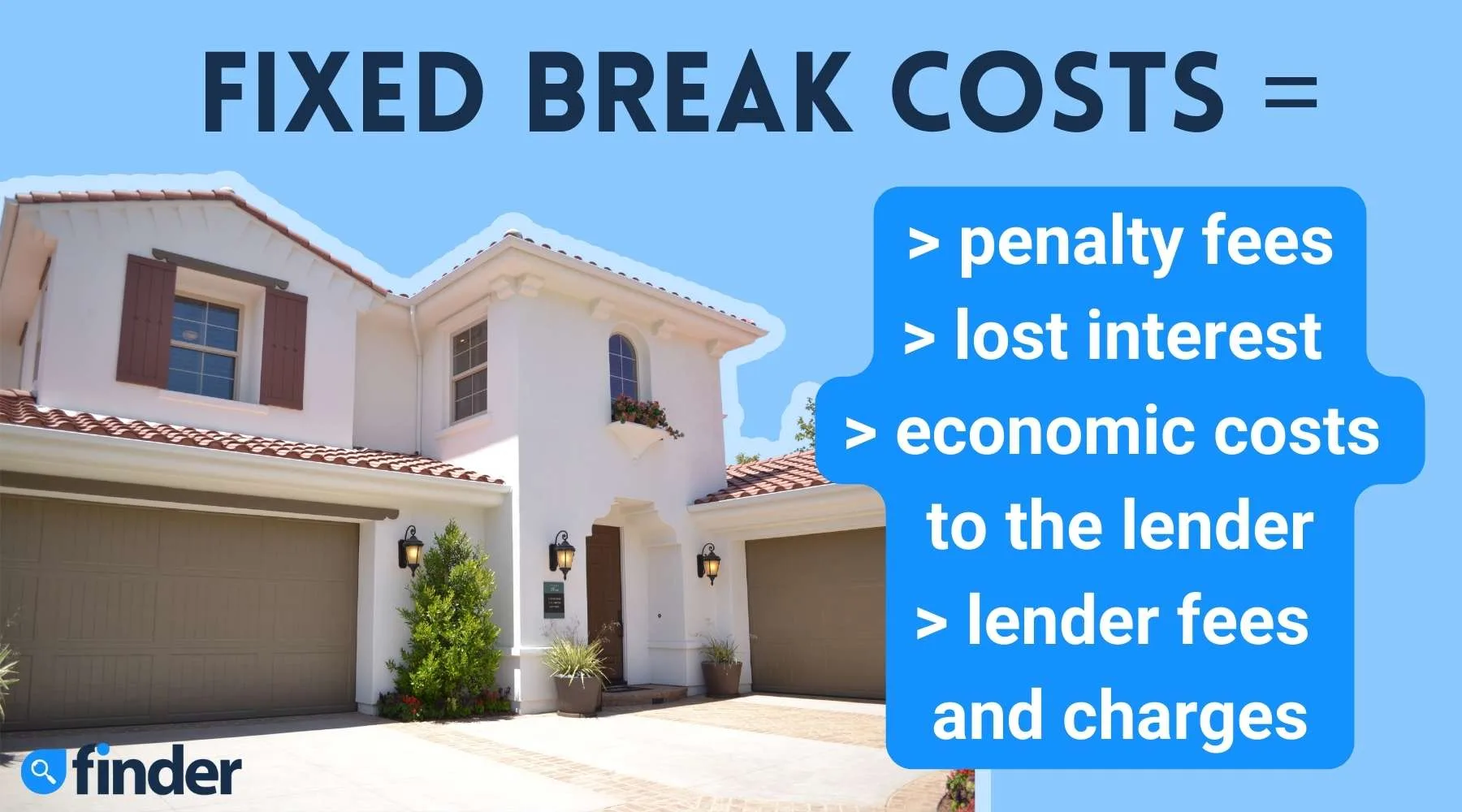Key takeaways
- You can end or exit a fixed rate home loan before the end of the loan term.
- Lenders charge you fees to compensate for any financial losses they incur as a result of breaking your fixed rate home loan early.
- If you are thinking about breaking a fixed home loan, your first step is to contact your lender and request a quote for breaking your loan inclusive of the early repayment cost.
A fixed loan break-cost calculator could help you work out what kind of fee you'll be charged when you break a fixed rate loan contract early, usually due to selling a property or refinancing.
Unfortunately, this calculator can't exist. This is because a fixed rate break cost is always personalised and based on the specific details of your loan. These details could include the following:
- Total loan term
- Loan length remaining on your fixed loan contract
- Total value of the loan
- The interest rate that you fixed at
- Current fixed interest rates on offer from that lender
While we can't give you an exact break-fee estimate, we can help you understand how banks calculate your break fee to give you an indication of what you may pay.
Can I end my fixed rate early?
Finder survey: How long do fixed rates on home loans last for Australians of different ages?
| Response | 75+ yrs | 65-74 yrs | 55-64 yrs | 45-54 yrs | 35-44 yrs | 25-34 yrs | 18-24 yrs |
|---|---|---|---|---|---|---|---|
| 3 yrs | 6.98% | 3.73% | 2.92% | 4.35% | 9.84% | 9.71% | |
| 2 yrs | 2.33% | 1.86% | 2.92% | 6.28% | 7.87% | 7.28% | 5.71% |
| 4 yrs | 2.33% | 1.86% | 1.75% | 2.9% | 3.54% | 1.94% | 2.86% |
| More than 5 yrs | 2.33% | 1.86% | 1.17% | 1.57% | 2.86% | ||
| 1 year | 1.24% | 2.34% | 3.38% | 4.33% | 1.46% | 2.86% | |
| 5 yrs | 2.92% | 3.38% | 3.54% | 2.91% | 2.86% |
Why do you pay a break cost on a fixed rate home loan?
Lenders charge you fees to compensate for any financial losses they incur as a result of breaking your fixed rate home loan early.
If you decide to break that contract by switching loans or lenders (or selling the property) before the fixed period has ended, your existing lender will want to be compensated for the financial loss they incur. You have promised to repay them interest for 3 years, and now you are ending the loan early. They can re-lend that money to someone else, but they may not make as much money if their fixed interest rate is now lower.
This is why you pay a fee – to compensate them for the lost interest you committed to pay in your loan contract.
What is considered "breaking" a fixed home loan?
- Switching to a different home loan product with the same bank or lender
- Switching to a different home loan with a different bank or lender by refinancing
- Making extra home loan repayments in excess of an accepted amount
- Repaying the loan in full before the end of the fixed rate period (due to selling the property or refinancing)
- When your loan falls into serious default, requiring it to be repaid immediately
What fees do I have to pay?
There are a few fees to pay when you break a fixed home loan.
There is often a penalty fee, which is set by each bank or lender, and usually costs $1-200. Not all banks charge this fee.
Next, there is an interest adjustment to cover the interest losses to the lender, as explained in our examples. This can be the most expensive part, often running to thousands (or even $10k+), depending on the interest rates at the time.
There may be a fee to cover the economic costs to the lender, which they charge to reimburse them for the cost/time to the lender of ending your contract early. Again, these are usually in the range of $1-200.
And lastly, there are lender fees and charges, which are set by each lender individually, and may be waived if you are ending the fixed rate loan, but staying with the same bank on a variable rate loan.

"A fixed home loan may give you the security of knowing your repayments for the period you decide to lock in your interest rate however life can change during this time and you may need to break your fixed rate loan. Contacting your lender is the first step to understanding what your fee will be. If you are moving homes, then instead of breaking your loan, you can "port" your loan known as security substitution. If you need to break out of your fixed rate loan then weigh up the costs versus the benefits to make an educated decision."
How does your lender calculate your fixed rate break costs?
There are some complicated formulas and calculations involved in calculating this rate – in fact, it's so complex, the amount actually changes daily.
Breaking a home loan during a fixed interest period can be expensive, which is why you should ask your lender how much it will cost you to break your fixed interest rate home loan before you decide to do it.
If you're considering getting a fixed rate home loan but you're concerned about flexibility, you might want to consider a variable mortgage instead.
See how much you can save with a lower rate
As for how they calculate your fixed rate, it gets a little complicated, but bear with us. Lenders will typically finance your home loan on the wholesale market with a fixed maturity date. At the time you switch loans or repay your loan early, the bank will use the Bank Bill Swap Rate (BBSR), or BBSW, to calculate your early repayment cost or break fee. Current BBSRs are displayed on the homepage of the Australian Financial Markets Association and the ASX website.
The BBSR is the interest rate charged on wholesale fixed rate borrowings for banks. It is a floating market, so rates change daily, if not by the minute. They use this because it is the most transparent indicator of the cost of funding for your loan.
If you wish to break your fixed rate loan, the lender will compare the BBSR when you originally entered the loan with the BBSR at the time you break the loan.
As BBSRs use specific time periods, such as a 3-year maturity BBSR, an early repayment cost will be calculated against a BBSR of the same time period that you have left on your loan. So if you have 1 year left on your 3-year fixed home loan, your original BBSR will be calculated against the 1-year BBSR on the day you break.
Like we said, it's complicated, and because of all of these different factors, the break fee you will be liable to pay changes daily.
Let's say you decide to break a 3-year fixed loan at the start of the third year, when you have 1 year remaining.
Your lender will compare the original market swap rate with 1-year market swaps (as that is the period remaining on the loan).
If the current BBSR is less than it was at the time of fixing, the customer will have to pay the difference on the amount that was agreed to be paid for the remaining term – as your lender has an obligation to keep up their repayments on their wholesale funding for your loan. They have an agreement to pay their wholesale lenders a fixed amount, whether those lenders are on the market or an internal lending arm. These charges compensate for the estimated cost in lost interest and administration time.
If the current BBSR is more than it was at your original time of fixing, then you won't have to pay any interest penalties. Other fees and charges may still apply.
Example: Fixed rate break cost calculation when fixed rates have dropped
Loan details
| Loan amount | $500,000 |
| Loan length | 30 years |
| Fixed period | 3 years |
| Repayment type | Interest-only |
| Repaid when? | March 2024 (2 years into a 3-year fixed period) |
| Interest rate of loan | 2.8% p.a. |
| 1 year of repayments remaining | $14,000 |
Early repayment cost calculation
| 3-year BBSR (April 2022) | 2.98% p.a. |
| 1-year BBSR (March 2024) | 2% p.a. |
| Difference between original 3-year BBSR and 1-year BBSR at break | 0.98% p.a. |
| Difference/original BBSR (0.98%/2.98%*100) | 32.89% |
| 1 year of repayments remaining | $14,000 |
| Early repayment adjustment (32.89% x $14,000) | $4,604 |
| Plus exit fees and penalties | $500 |
| Total early repayment adjustment + fees | $5,104 |
Loan details
In the above example, a borrower has broken a 3-year, interest-only home loan at the start of the final year and during this time period, fixed rates and the BBSR decreased.
As the borrower, you have to pay the difference in the interest rate that was agreed to be paid in the final year, so the lender doesn't incur a financial loss.
Note that this example uses hypothetical calculations that don't reflect the actual BBSR for these time periods.
Example: Fixed rate break cost calculation when fixed rates have increased
Loan details
| Loan amount | $500,000 |
| Loan length | 30 years |
| Fixed period | 3 years |
| Repayment type | Interest-only |
| Repaid when? | March 2024 (2 years into a 3-year fixed period) |
| Interest rate of loan | 2.80% p.a. |
| 1 year of repayments remaining | $14,000 |
Early repayment cost calculation
| 3-year BBSR (April 2022) | 2.98% p.a. |
| 1 year BBSR (March 2024) | 4.20% p.a. |
| 1 year of interest remaining | $14,000 |
| Early adjustment | -$5,732 |
| Estimated exit fees | $500 |
| Total early repayment adjustment | $500 |
Loan details
In the above example, a borrower has broken a 3-year, interest-only home loan at the start of the final year; however, during that time period, fixed rates have increased.
The lender now stands to earn more money by re-lending that money to someone else.
Therefore, as the borrower, you don't have to pay hefty interest penalties.
Note that this example uses hypothetical calculations that don't reflect the actual BBSR for these time periods.
How does fixing a loan for 1 year work?
With a fixed rate home loan, your rate doesn't change during the fixed period. After the fixed period ends, the loan reverts to a variable rate loan. With a variable interest rate, your lender can change your interest rate at any time.
Most Australian lenders let borrowers fix their rate for a period between 1 and 5 years.
If you want to fix your rate for a longer period, check out our guides on:
- 1-year fixed rate loans
- 2-year fixed rate loans
- 3-year fixed rate loans
- 4-year fixed rate loans
- 5-year fixed rate loans
Compare your refinancing options
If you are thinking about breaking a fixed home loan, your first step is to contact your lender and request a quote for breaking your loan inclusive of the early repayment cost. Then, compare the interest costs of a potential new loan.
You should also weigh the pros and cons of fixed and variable rates when making your decision to switch.
Sources
Ask a question
27 Responses
More guides on Finder
-
4-year fixed rate home loans
Compare 4-year fixed rate home loans from lenders big and small. Learn if these loans are right for you.
-
10-year fixed mortgage rates
While getting a 10-year fixed rate home loan might be a good idea if you want to keep your repayments the same over the next decade, you will pay more if interest rates drop.
-
Fixed rate interest in advance home loans
Save on interest rates and enjoy tax savings with fixed rate interest in advance home loans.
-
Why 30 year fixed mortgage rates don’t exist in Australia
Thirty year fixed rate home loans don't exist in Australia, unlike in the US where they're very common.
-
5-year fixed rate home loan rates in Australia
A competitive 5-year fixed rate home loan will see your repayments stay the same for a large chunk of your home loan.
-
Compare 3-year fixed rate home loans
A fixed-rate home loan can offer you stability and peace of mind. Find out if a three-year fixed rate home loan is right for you.
-
2-year fixed rate home loans
Enjoy the stability of knowing your repayments won’t change for 2 years.
-
Compare 1-year fixed rate home loans
Find a competitive 1-year fixed interest rate home loan. Compare your options and apply today.



Is there any other way we can get away with breaking fee? If we get a total new loan from other bank and pay off the old one, would that still be classified as breaking the fixed rate?
Hi Maddy,
Thanks for your enquiry.
You’ve come through to finder.com.au which is an online comparison service so please keep in mind that we do not offer home loans ourselves.
It would be best that you speak with your lender directly to discuss their treatment of break costs for a fixed rate loan.
Thanks,
Belinda
Hi
I have a similar issue as Mick with Westpac.
They have charged me a large break fee due to a movement in the wholesale interest rate (BBSR), which I don’t understand as the fixed rate I was on was 4.99% and the current rate they advertise is 4.94%.
I would have imagined that the BBSR would move in line with the rates offered to retail?
In any case, I need to find the BBSR for 18/10/13 and cannot find it anywhere… Are you able to help?
Hi Ryan,
Thanks for your question.
Please get in touch with AFMA directly to request historical BBSW rates that date back further than 10 days. These are not published on their website and please note a fee may be involved.
Cheers,
Shirley
Many Thanks Shirley but i am really struggling to find historical data for the specific days i mentioned in my earlier message. Any other options.
Many Thanks
Hi Mick,
I’ve responded to you through email, please check your inbox.
Cheers,
Shirley
Hi,
I was charged a penalty for breaking my fixed rate with CBA. When i have questioned the figures (swap rates) that were used to calculate this figure the CBA are unable to give me these stating they are computer generated. I find this unbelievable how can i be charged a penalty but they cant give me the figures used to do this. I want the swap rate figures used so i can calculate the penalty myself using their formula. I have been passed from dept to dept without success.
I have tried to find the swap rates myself but am finding it very difficult to access these. Are you able to inform me where i can get historical swap rate figures for 27/06/2013 (start of my fixed rate) and 05/12/2014 (when i broke the fixed rate). The fixed rate was for a three year period.
Many Thanks
Hi Mick,
Thanks for your question.
You can find past data regarding the BBSW on AFMR webpage.
I hope this helps,
Shirley
Is selling your home and paying out a fixed term loan classified as an early repayment of the loan.
Hi Sylvia,
Thanks for your question.
Unfortunately it is classified as an early repayment of the loan, as you’re repaying the full amount before the fixed term.
If you’d like to know what fees are involved, please get in touch with your lender.
Cheers,
Shirley